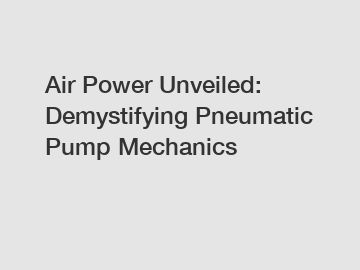Feb. 09, 2024
Energy
Air Power Unveiled: Demystifying Pneumatic Pump Mechanics.
Pneumatic pumps play a crucial role in various industries, yet their mechanics can often seem complex and enigmatic. In this article, we will demystify the workings of pneumatic pumps, shedding light on the various components and the technology behind them. Understanding the fundamentals of pneumatic pumps can help individuals and businesses make more informed decisions regarding their applications. So, let's delve into the intricacies of air power and discover the inner workings of pneumatic pump mechanics.
What are Pneumatic Pumps?

Pneumatic pumps are devices that utilize compressed air or gas to transfer fluids or generate pressure. They are commonly used for applications that require precision control or are sensitive to contamination, such as in the chemical, pharmaceutical, and food industries. Pneumatic pumps offer benefits such as adjustable flow rates, safety in hazardous environments, and reduced maintenance.
Primary Components of Pneumatic Pumps.
1. Compressor.
The compressor is the heart of a pneumatic pump system. It compresses air or gas and increases its pressure, providing the necessary power for the pump to work effectively. Compressors can be classified into reciprocating, rotary, or centrifugal types, each with its unique advantages and suitable applications.
2. Pneumatic Motor.
The pneumatic motor converts the energy from the compressed air or gas into mechanical motion. It drives the pumping mechanism of the device, transferring the fluid or generating pressure as required. Pneumatic motors are typically lightweight and require minimal maintenance compared to their electric or hydraulic counterparts.
3. Control Valve.
The control valve is responsible for regulating the amount and timing of compressed air or gas entering the pneumatic motor. It enables the operator to control the speed, torque, and direction of the motor, thus offering precise control over the pump's performance. Different types of control valves, such as throttle valves or proportional valves, can be used depending on the desired level of control.
Working Principle of Pneumatic Pumps.
Pneumatic pumps operate based on the principle of reciprocating motion. When compressed air or gas enters the pneumatic motor, it pushes a piston or diaphragm that creates back-and-forth motion. This reciprocating motion drives the pumping mechanism, which then moves the fluid or generates pressure accordingly. The control valve regulates the air or gas flow, controlling the speed and force of the pumping action.
Applications of Pneumatic Pumps.
Pneumatic pumps find applications in various industries due to their versatility and reliability. They are commonly used in chemical processing, oil and gas extraction, wastewater treatment, and even automotive and aerospace industries. Their ability to handle corrosive or sensitive fluids, along with the ease of maintenance, makes them indispensable in numerous manufacturing and processing processes.
Conclusion.
Understanding the mechanics behind pneumatic pumps allows us to appreciate the efficiency and reliability they bring to industrial processes. By utilizing compressed air or gas, these pumps offer precise control, reduced maintenance, and increased safety in various applications. Whether it's transferring fluids, generating pressure, or controlling flow rates, pneumatic pumps play a vital role in numerous industries.
To learn more about pneumatic pump mechanics or discuss specific applications, please do not hesitate to contact us. Our team of experts is ready to provide guidance and support for all your pneumatic pump needs.
Keywords: contact us.
Contact us to discuss your requirements of aodd pump manufacturers, piston pump applications, aodd pump applications. Our experienced sales team can help you identify the options that best suit your needs.
If you are interested in sending in a Guest Blogger Submission,welcome to write for us!
All Comments ( 0 )